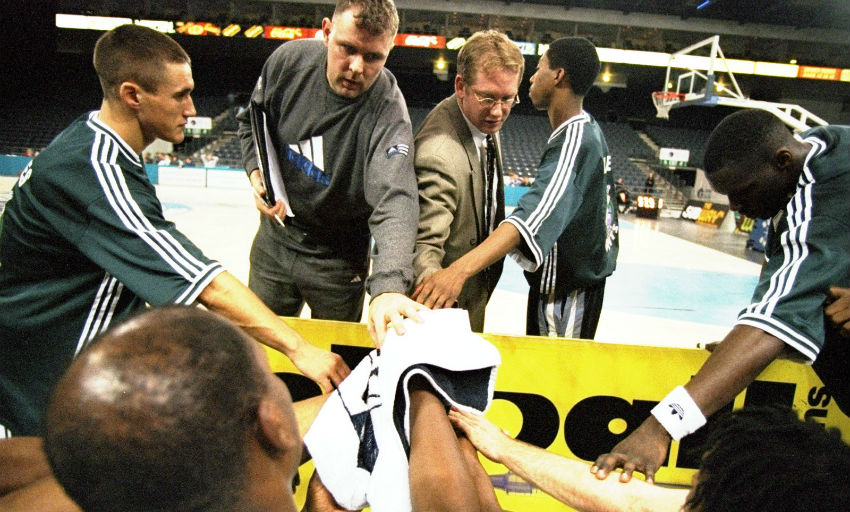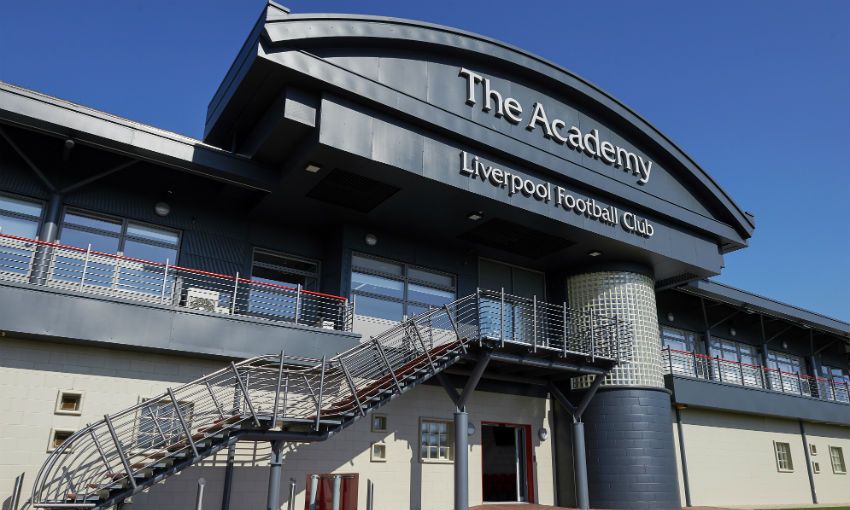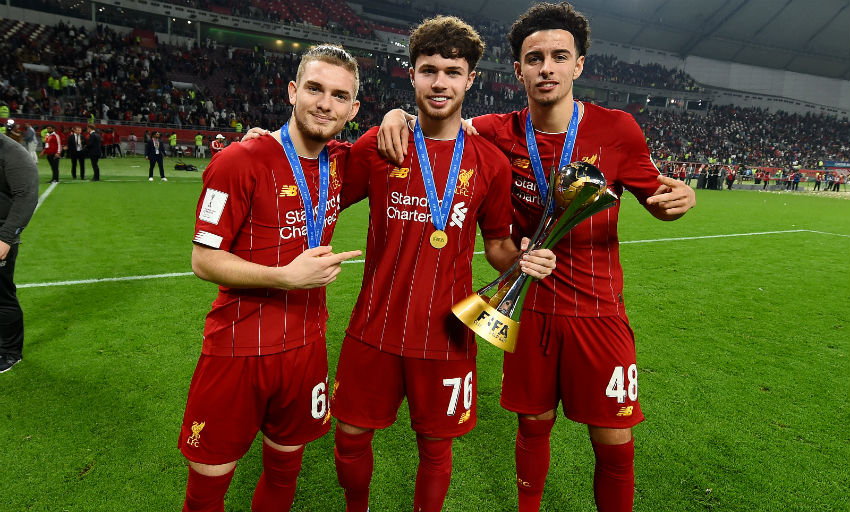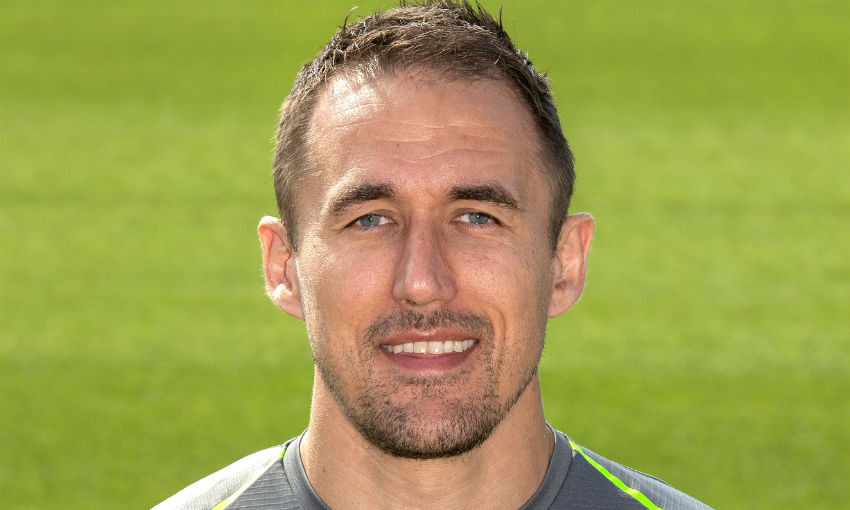Behind the Badge: From professional basketballer to Melwood physio
Tony Jones cracks a joke and wonders whether regaling his backstory will make for the perfect antidote to insomnia.
It's self-deprecating, of course. Few have a journey like his.
It involves moving to America as a teenager for basketball and earning a sought-after college scholarship there. He would then play the sport professionally before going to work for the NHS, and then sidestep into football with his boyhood club.
Indeed, Jones is now living another one of his dreams within the medical department at Liverpool. His role involves working closely with the young players in and around the first-team set-up.
"It's been amazing for me as a Liverpool fan," he tells Liverpoolfc.com.

Photo: Jones (top left) while playing for the Manchester Giants in 1998
Tony had attended various international basketball camps as a youngster and competed at county level. At 17 years of age, he grasped the opportunity to spend his senior year of high school in Monroe, Georgia to play basketball and study.
From there, he accepted a four-year full scholarship offer at Piedmont College, playing in the NCAA. Foreshadowing somewhat, he began a degree in sports therapy at the same time.
But Jones would return home two years into his college journey. He joined the Manchester Giants, who he'd previously spent time with in the youth ranks, to try to stake a claim in their first team.
The Giants were one of the biggest sides in the UK in that period – known to play in front of a sold-out Manchester Arena – with Nick Nurse one of Jones' head coaches there. Nurse coached the Toronto Raptors to the NBA championship in 2019.
A final venture saw him spend a season-and-a-half playing in Spain, where reality began to set in that this particular aspect of his life was coming to an end.
"If I'm honest, my legs started to go and I was thinking, 'Right, let's look at a career that will give me a bit of longevity now,'" he remembers.
"I'd enjoyed it for a long time and seen a lot of lovely places and great things, but I needed to get a job.
"Because I came back early [from America], it always niggled on me that I wanted to finish my degree."
As a result, Jones started studying sports rehabilitation on a part-time basis at the Lilleshall National Sports Centre before joining the NHS. While with the NHS, he continued his studies on the side at the University of Salford over four years.
He would also begin to test the waters at Liverpool's Academy, taking up a part-time role and juggling his job in the NHS. In 2016, a reshuffle paved the way for Jones to take up the permanent position as head schoolboy physiotherapist, overseeing the U9s to U16s phase.

Continuing to climb the ladder, Jones details: "Then I ended up moving to a role assisting the U18s/U23s phase and did that for a year. We had a rotation that involved some of the Academy medical staff helping at Melwood for four weeks at a time.
"So we'd spend like four or five weeks at Melwood and come back in. It was a great opportunity because we got to see what was going on in there, but also we can apply our knowledge of the adolescent elite athlete in the first-team environment.
"If you look at the lads now – Harvey Elliott, Curtis Jones, Neco Williams, Paul Glatzel, Sepp van den Berg, Ki-Jana Hoever – they were all filtering into this first-team set-up but still adolescent, if you like.
"We were able to apply our knowledge and give our expertise in an environment that's used to dealing with grown men – you come at it from a different angle. It was embraced.
"I just ended up staying there from the end of last season – what a fantastic time to be there! I was asked to report for pre-season to help out and I'm very fortunate that they asked me to stay on for this season.
"My role has now developed, so I liaise with all medical staff at the Academy regarding any youth players that will be coming through to Melwood to facilitate a smooth transition for the player and ensure all medical needs are met.
"One of my first trips ever with the club when I was a part-timer was over in Poland with Neco, Curtis, Paul, who were 12 or 13 years old.
"To be able to see them filtering in now, you're almost like on that ride with them. It's quite an emotional thing to see Curtis wearing his armband now, see Paul playing against Tranmere and Neco now."

Jones' role is deemed to be an important one as the physiotherapy needs of a teenager are vastly different to those of a senior member of the squad.
He explains: "Obviously with young and older players, they do get acute ankle, knee and hip injuries. But with an adolescent body, it's difficult because sometimes they're still getting to know their body.
"They're still trying to get into knowing, 'Is that pain or is that just more a DOMS-related [delayed onset muscle soreness] thing?', or 'Should I be feeling this with load?'
"Nothing can really prepare you for that [step up] – you're going up against the best in the world, aren't you?
"With the older guys, you're dealing with sort of chronic injuries, chronic tendinopathies, stuff that's been there that they've managed with the medical team and themselves. Whereas it tends to be your more growth-increased, load-related issues with the adolescent lads.
"Another big part of my current role is ensuring the smooth transition for an Academy player from the Academy to a first-team environment.
"Obviously first-team dressing rooms can be a daunting place at first and I try to ensure I'm the first point of contact for the lads for medical or general problems. Sometimes it's nice to have a friendly face in such a high-pressure environment."
Ultimately, the trust and relationship built over years is fundamental to Jones' role.
Injuries – great or small – have to be understood as short-term obstacles in the bigger picture of a young player's pursuit to grasp senior opportunities.
"It's developing that trust so they don't think you're going to pull them out [of training] for everything but making sure a safe decision has been made," says Jones.
"It's all about communication, education, getting them to know their body. You're not pulling them out because you want to, you're pulling them out because it's the bigger picture and you don't want to make it worse."
Jones also believes his experience within professional sport, along with the benefit of hindsight, can help him further relate to those who he treats.
He adds: "I'll be honest with you, I never told a coach I was injured. Never. So I understand that.
"Obviously it's a completely different sport and these lads are playing at elite level and I get that. But I understand in getting to know your body and that competitiveness and desire to play is at the forefront of everything. I try to discuss that with them.
"I can also probably tell them about mistakes I made. Every case is different but I've pushed on through things and science has come on so much since I was playing – it's a different ball game now.
"The science now, we monitor everything. From the minute you walk in, we know what you're eating, what you've done, how many high-speed distances you've done, how many decelerations you've done, how many weights you've lifted, how much treatment you've had – everything.
"We can monitor things to give them that little extra bit of edge or to improve their performance. It's a completely different animal to when I was playing – which is a benefit because I made mistakes and was probably advised wrongly in some cases."
Such a background can, therefore, offer an explanation as to why Jones is constantly willing to go above and beyond for players.
To him, this is no job. Consider it more a vocation.
"I'm very fortunate that I've been able to help and guide the lads through this journey," he concludes. "I love seeing the young lads come through and be rewarded for all their hard work on the training pitches with the excellent coaches such as Alex Inglethorpe, Barry Lewtas and Neil Critchley before he left.
"All those countless hours in the gym doing the pre-activation, the gym work and being there with them and then starting to see the final product and them filtering in, it's like, 'Well off you go, mate. Well done. Let's see what you can do.'
"You invest a lot of time and effort and there are emotions in it. It's more than a job. You're putting in a lot of time, a lot of effort, a lot of emotions – it's everything because you want the best for them, you want to give them the best.
"This is Liverpool Football Club, so you expect the best. Standards are high. You expect the same from them what you put in yourself.
"It has to be that way because to get to the top you have to make sacrifices."
More from our Behind the Badge series



